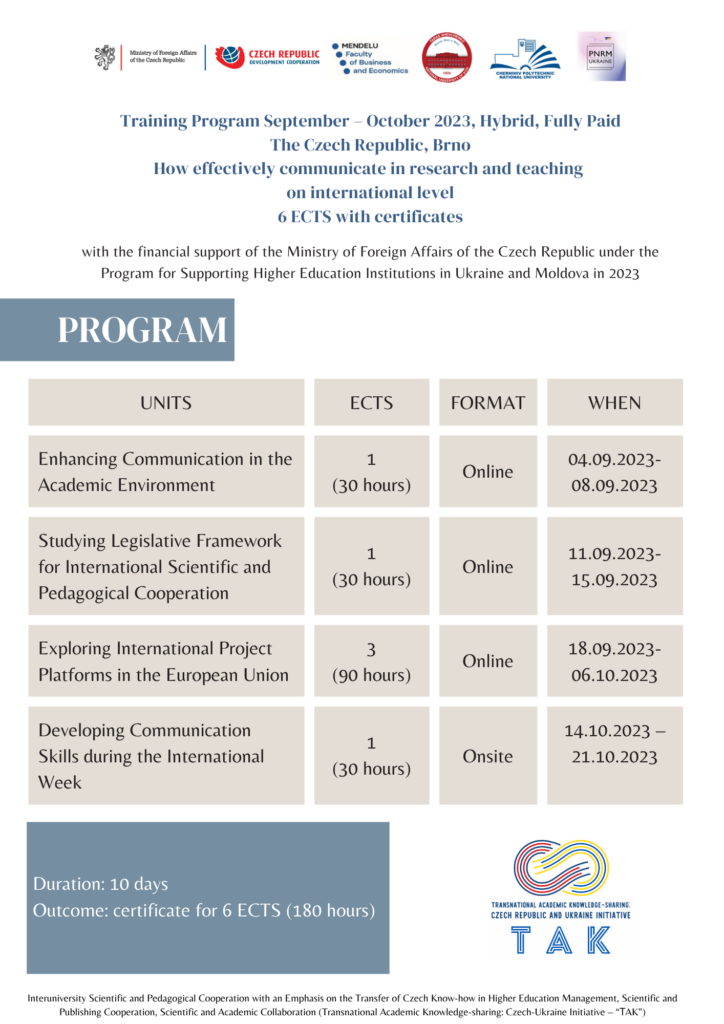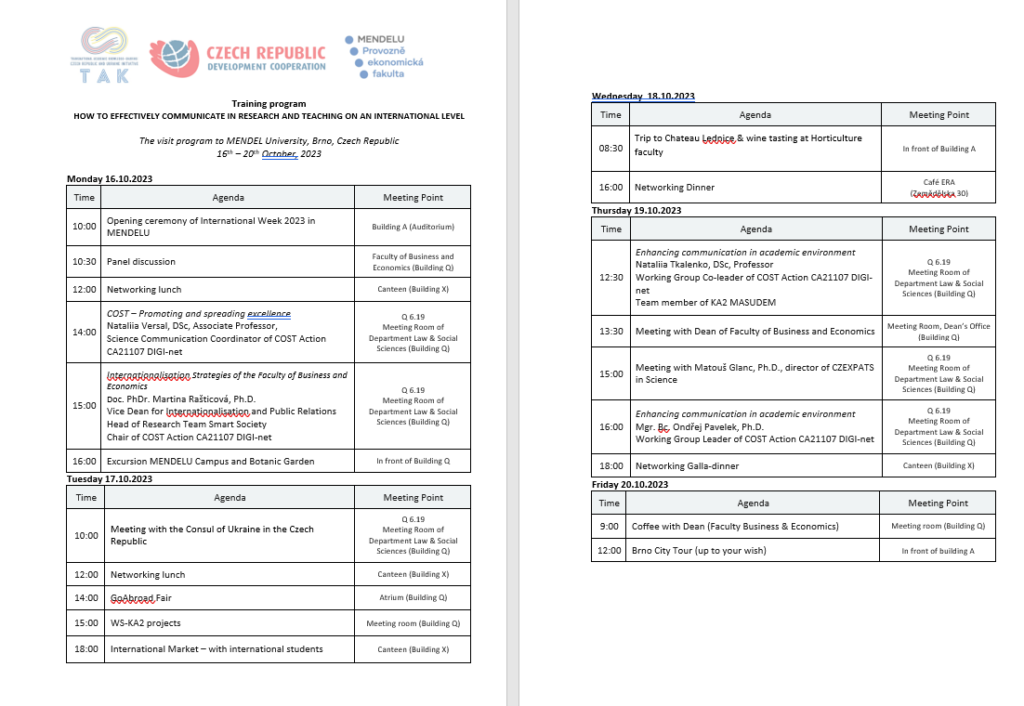
We support joint research projects between Czech and Ukrainian researchers to enable the exchange of scientific knowledge and practices, and to enhance the quality and impact of research.
We facilitate academic and research cooperation between partner universities and institutes, enabling the exchange of staff, students, and researchers, sharing expertise, and promoting academic and research mobility.
Ми підтримуємо спільні наукові проєкти між чеськими та українськими дослідниками, щоб сприяти обміну науковими знаннями та практиками, а також підвищувати якість і вплив досліджень.
Ми сприяємо академічній та науковій співпраці між партнерськими університетами та інститутами, забезпечуючи обмін викладачами, студентами та дослідниками, обмін досвідом і заохочуючи академічну та наукову мобільність.
Joint Czech-Ukrainian monograph
Project Publications
What Drives Economics Students to Use Generative Artificial Intelligence?
Abstract
The increasing integration of Artificial Intelligence (AI) into education requires studying the motives for its use among students. This study aims to identify the key motivations for economics students to use AI and compare these motivations by grade level and gender. The study examines satisfaction with the use of AI and analyzes the number of AI tools used.
An anonymous empirical study was conducted among 264 students from the Faculty of Economics at Taras Shevchenko National University of Kyiv, Ukraine. Data analysis included descriptive statistical methods, non-parametric statistical methods, and exploratory factor analysis.
The study found that students’ main motivations for using AI are the automation of routine tasks (34.2%) and the need to save time (21.5%), while 18.7% use AI to compensate for lack of experience. Among Bachelor’s students, motivations such as automating routine tasks and saving time increased from 53% to 58% over the course of their studies, while lack of experience decreased from 22% to 15%. In contrast, Master’s students showed a decrease in routine automation (from 36% to 28%) but an increase in the need to compensate for lack of experience (from 15% to 28%) and to save time (from 18% to 25%). In terms of gender, men are more likely to use AI for learning and personal development, while women are slightly more likely to use AI for work. More than 38% of respondents say they need to use at least 2 AIs to achieve their goals.
You can read the full text of the article at the following link: https://www.businessperspectives.org/index.php/journals/knowledge-and-performance-management-2/issue-465/what-drives-economics-students-to-use-generative-artificial-intelligence
To cite: Mariia Balytska, Martina Rašticová, Nataliia Versal, Ihor Honchar, Nataliia Prykaziuk and Nataliia Tkalenko (2024). What drives economics students to use generative artificial intelligence?. Knowledge and Performance Management, 8(2), 51-64. doi:10.21511/kpm.08(2).2024.05
Insights into diversity management as a pillar of sustainable development in Czech and Ukrainian universities
Abstract
Diversity management encompasses dimensions such as gender and sexual orientation, age, disabilities, nationality, ethnicity, religion, and socio-economic status (SES) and is fundamental to sustainable development, enabling higher education institutions (HEIs) to foster inclusive, equitable, and resilient academic environments. This study examines diversity management practices in seven Czech and five Ukrainian HEIs recognized as leaders in the Times Higher Education (THE) Impact Rankings. Data were obtained from university websites, SDG reports, or annual reports focusing on SDG 1, SDG 2, SDG 4, SDG 5, SDG 8, SDG 10, and SDG 16. The analysis shows that Czech universities demonstrate structured policies and stable resources, enabling them to offer comprehensive support for professional growth, gender equality, and inclusivity. Examples include sabbatical opportunities, gender-balanced organizational policies, and adaptive measures for individuals with disabilities. Conversely, Ukrainian universities exhibit remarkable resilience and adaptability, addressing challenges posed by the ongoing war. Key initiatives include supporting displaced students and veterans, restoring damaged infrastructure, and integrating inclusive education practices under wartime constraints. Despite differing contexts, both countries emphasize financial aid and scholarships as critical tools for ensuring equitable access to education. The findings underscore the importance of leveraging diversity dimensions to develop effective strategies for achieving SDGs while adapting to regional and institutional specificities.
You can read the full text of the article at the following link: https://www.businessperspectives.org/index.php/journals/problems-and-perspectives-in-management/issue-473/insights-into-diversity-management-as-a-pillar-of-sustainable-development-in-czech-and-ukrainian-universities
To cite: Martina Rašticová, Nataliia Tkalenko, Nataliia Versal, Mariia Balytska and Nataliia Kholiavko (2025). Insights into diversity management as a pillar of sustainable development in Czech and Ukrainian universities. Problems and Perspectives in Management, 23(1), 263-287. doi:10.21511/ppm.23(1).2025.20
DESIGNING A SUSTAINABLE SOCIAL PROTECTION SYSTEM IN UKRAINE: A COMPREHENSIVE EVALUATION
Abstract
Social values hold heightened importance, particularly during wartime. Ukraine’s social protection system is designed to help vulnerable groups of people, yet it faces financial constraints, with many resources being redirected towards military needs. Conse-quently, evaluating its effectiveness is crucial, and it is essential to develop recommen-dations to enhance its resilience and adaptability.The goal of this research is to evaluate the social protection system of Ukraine and to make recommendations to fill the gaps in its functioning.The evaluation of Ukraine’s social protection system utilized the Core Diagnostic Instru-ment (CODI tool) from the Inter-Agency Social Protection Assessments to the extent possible, given the constraints posed by limited information availability. This tool con-sists of four modules: policy, program design, program implementation, and system assessment guidelines. Thirteen experts from Ukraine provided an assessment of eight criteria. This comprehensive evaluation of Ukraine’s social protection system allows for the identification of its strengths and weaknesses.The social protection system of Ukraine was evaluated, receiving an average score of 2.5 out of 4. Strengths include a well-developed legislative base for social protection and the use of a program-targeted method for implementing budget programs with social dimensions. However, weaknesses were also identified, such as low levels of so-cial standards, insufficient funding, numerous social protection authorities with potential duplications and overlaps in their activities, and a weak information dissemination sys-tem regarding the realization of social protection goals.Several measures are needed to address the shortcomings in Ukraine’s social protection system: raising the level of social standards to better reflect current economic conditions and consumer price trends; reviewing the sources of financing for social protection pro-grammes to ensure a more effective allocation of resources; and modernising the social protection reporting system to improve the decision-making process. The implementa-tion of these recommendations will contribute to the development of a more adaptable and resilient social protection system in Ukraine.
You can read the full text of the article at the following link: https://fkd.net.ua/index.php/fkd/article/view/4562/4267
To cite: Ігнатюк, А., Раштіцова, М., Приказюк, Н., Шолойко, А., Ткаленко, Н., & Версаль, Н. (2024). КОНСТРУЮВАННЯ СТАЛОЇ СИСТЕМИ СОЦІАЛЬНОГО ЗАХИСТУ В УКРАЇНІ: КОМПЛЕКСНА ОЦІНКА. Financial and Credit Activity Problems of Theory and Practice, 6(59), 577–589. https://doi.org/10.55643/fcaptp.6.59.2024.4562
DIGITAL BANKING AND (IN)EQUALITY: A SYSTEMATIC OVERVIEW
Abstract
The rapid expansion of digital banking has revolutionised financial services globally and stipulated financial inclusion. Still, debates remain about the (in)equalities that digital banking can contribute to. Its impact varies significantly among different social groups, which is why this review will show how digital banking contributes to inequalities across them and what policy responses can be used to overcome challenges.The study employs a systematic literature review of 27 articles from 1999 to September 2023. Firstly, the review highlights a significant research gap in digital banking and inequalities in low-income countries. Secondly, there is an obvious shift in the research time from high-income countries to upper-middle and lower-middle countries, which may indicate that the problem of inequality under digital banking in high-income coun-tries is not under urgent question. However, the issue of inequality remains relevant in upper-middle and lower-middle countries despite the previous experience gained in high-income countries, which may indicate gaps in the implementation of policy deci-sions. Thirdly, the most attention in research papers to inequalities is paid to age (74.1%), gender (66.7%), education (40.7%), and income (25.9%). The age gap, in particular, remains pronounced, with the elderly being disproportionately affected. The analysed research highlights that policies place significant responsibility on banks, but there is a pressing need for collaborative efforts involving the state, financial regulators, and banks, especially with an emphasis on training initiatives to bridge gaps in digital financial literacy.
You can read the full text of the article at the following link: https://fkd.net.ua/index.php/fkd/article/view/4657/4277
To cite: Rašticová, M., Versal, N., Prykaziuk, N., Balytska, M., & Dudnyk, Y. (2025). DIGITAL BANKING AND (IN)EQUALITY: A SYSTEMATIC OVERVIEW. Financial and Credit Activity Problems of Theory and Practice, 1(60), 49–62. https://doi.org/10.55643/fcaptp.1.60.2025.4657
Support for young scientists
One of the planned activities in the project is the presentation of research by young scientists at international scientific and practical conferences. In 2024, six presentations were delivered at conferences:
– 14th International Scientific-Practical Conference of Students, PhD students, and Young Researchers “Youth of Science – 2024: Socio-Economic and Humanitarian Aspects of Society Development”, Ministry of Education and Science of Ukraine, Institute of Modernization of Content of Education of Ministry of Education and Science of Ukraine, Chernihiv Polytechnic National University, April 2024. https://ir.stu.cn.ua/handle/123456789/30262
1. Vitalii Soroka, PhD student, scientific supervisor Nataliia Tkalenko PROBLEMS OF FORMING FINANCIAL MECHANISMS FOR THE DEVELOPMENT OF TERRITORIAL COMMUNITIES IN UKRAINE
2. Marina Kutova, PhD student scientific supervisor Nataliia Tkalenko ADAPTATION OF E-GOVERNMENT AND INFORMATION SECURITY STRATEGIES TO NEW REALITIES
– III International Forum “Economics. Finance. Business. Management. FROM RECOVERY TO GROWTH” at Taras Shevchenko National University of Kyiv, May 2024. https://www.efbm.org/
3. Mariia Balytska, a young researcher from Taras Shevchenko National University of Kyiv with Associate Professors Martina Rašticová and Nataliia Versal Financial Inclusion Across Gender: Case of the Czech Republic and Ukraine
– VI International Scientific-Practical Conference “Modern Paradigm of Public Management”, Ivan Franko National University of Lviv, Chernihiv Polytechnic National University, Lviv Regional Institute of Public Administration of the National Academy of Public Administration under the President of Ukraine, Centre for Adaptation of the Civil Service to the Standards of the European Union, DTI University, Dubnica nad Vahom (Slovensko), Technical University of Kosice (SLOVENSKO), VARNA FREE UNIVERSITY “CHERNORIZETS HRABAR” (BULHARSKO), Kielce University of Technology, Świętokrzyska Polytechnic (Polsko), NATIONAL INSTITUTE OF ECONOMIC RESEARCH (Gruzie), November 2024. https://lnu.edu.ua/vi-mizhnarodna-naukovo-praktychna-konferentsiia-suchasna-paradyhma-publichnoho-upravlinnia/
4. Marina Kutova, PhD student scientific supervisor Nataliia Tkalenko The Impact of Political and Social Factors on the Development of E-Government and Information Security in Ukraine
– 6th International Scientific-Practical Conference “December Readings”, TARAS SHEVCHENKO NATIONAL UNIVERSITY OF KYIV, League of Insurance Organizations of Ukraine, Association “Insurance Business”, Business Strategy Center “Perspective”, Aflaton International, December 2024. https://econom.knu.ua/2024/12/10/%D0%B3%D1%80%D1%83%D0%B4%D0%BD%D0%B5%D0%B2%D1%96-%D1%87%D0%B8%D1%82%D0%B0%D0%BD%D0%BD%D1%8F-2024/
5. Yana Dudnik, PhD student, scientific supervisor Nataliia Versal Ecological and Social Responsibility of Banking Institutions in Ukraine
6. Nataliia Versal, Martina Rašticová, Ihor Honchar, Mariia Balytska WHAT MOTIVATES ECONOMICS STUDENTS TO USE ARTIFICIAL INTELLIGENCE?
The program for the visit of Ukrainian professors during the MENDELU International Week 2024
Minutes of the Meeting and Discussion on the Joint Czech-Ukrainian Monograph
Training Program for Ukrainiane Academic Stuff


